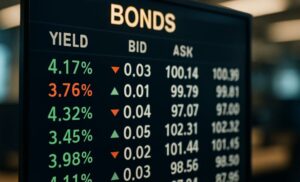Uncertainty
April 2025 was a month of heightened volatility and cautious optimism in both global and Indonesian bond markets, shaped largely by escalating US tariff policies and China’s retaliatory measures. The US imposed broad tariffs, including a 125% tariff on Chinese goods, triggering China’s 125% tariff on US products and export restrictions on critical materials like rare earths. These developments fuelled uncertainty, leading to a rise in US Treasury yields, with the 10-year yield climbing about 10 basis points to around 4.35%. Federal Reserve Chair Jerome Powell’s warnings about the inflationary and growth risks posed by tariffs contrasted with President Trump’s aggressive trade stance, adding to market jitters and influencing global bond market dynamics.
In Indonesia, the domestic bond market showed resilience despite external pressures. Benchmark yields moved mixed but generally stable: the 10-year government bond yield hovered near 6.93%, while the 5-year yield edged up slightly to 6.78%. The yield spread between Indonesian 10-year bonds and US Treasuries remained elevated, reflecting emerging market risk premiums amid global trade tensions and monetary policy divergence. Trading activity contracted notably, with transaction volumes down by around 20% and frequency falling by nearly 15%, indicating cautious investor sentiment amid ongoing uncertainties.
The rupiah experienced volatility in response to global developments, fluctuating between approximately Rp16,650 and Rp16,870 per US dollar during April. Bank Indonesia (BI) maintained BI Rate at 5.75%, signaling a cautious stance amid Rupiah volatility and global uncertainties. BI’s steady policy helped anchor domestic bond yields and supported investor confidence despite external shocks.
On the bilateral front, Indonesia engaged in ongoing trade negotiations with the United States aimed at mitigating tariff impacts and fostering closer economic cooperation. While still in early stages, these talks were viewed positively by investors as a potential buffer against the broader US-China trade conflict’s spillover effects on Indonesia’s economy and financial markets.
Indonesia’s bond issuance remained robust in the first quarter of 2025, with government securities issuance reaching Rp282.6 trillion and corporate bond issuance surging by over 77% year-on-year to Rp46.75 trillion. This strong issuance activity reflected sustained investor appetite for Rupiah-denominated fixed income instruments amid global risk aversion.
Product Recommendation
| FIXED INCOME FUND | |
|---|---|
| MIDU | MIDU invests in Bond Instruments with a Medium-Term segment and is categorized as low to medium risk. Investors bear the risk associated with the Bond Portfolio. |
| IDAMAN | IDAMAN invests in Indonesian Government USD Bonds with a short duration and is categorized as medium risk. Investors bear the risk associated with the Bond Portfolio. |
| MIDO2 | MIDO2 invests in Indonesian Government Rupiah Bonds with a long duration and is categorized as high risk. Investors bear the risk associated with the Bond Portfolio. |
| BALANCED FUND | |
| MIA | MIA invests in Equities, Bonds and Money Market with Medium Term and categorized Medium Risk. Investors bear the risk associated with the equity portfolio. |
| MISB | MISB invests in Sharia Equities, Sukuk and Money Market Sharia with Medium Term and categorized Medium Risk. Investors bear the risk associated with the equity portfolio. |
For More Information
Contact Mandiri Investasi – (021) 526 3505
Mandiri Investasi Whatsapp – 0816 86 0003
Mandiri Investasi Email – [email protected]
Mandiri Investasi Website – www.mandiri-investasi.co.id
Moinves Website – www.moinves.co.id
DISCLAIMER
The opinions expressed in the article are for general informational purposes only and are not intended to provide specific advice or recommendations for individuals or specific mutual fund or investment products. It is intended solely to provide education about the financial industry. Views reflected in the content may change at any time without notice. All performance data and investment returns mentioned in this article cannot be used as a basis for calculation to buy or sell a mutual fund. This data is performance records based on historical data and is not a guarantee of future mutual fund performance. Investment through mutual funds carries risks. Investors are required to read and understand the prospectus before deciding to invest through mutual funds.
Written by











Leave a Reply